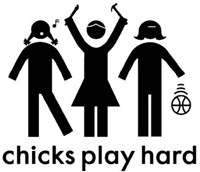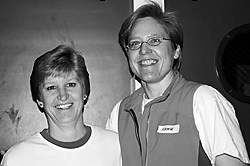Anna Collins '86, M.B.A. '95, got her start in community service early, volunteering with her parents in Michigan for activities such as state political campaigns. "My mom always donated a lot of time just to helping people, and I saw her as a role model," she explains. Her concept of community service is built around mentoring; during summers at Harvard, she coached youngsters at local basketball and volleyball camps. (The all-Ivy player was co-captain of the women's basketball team.)
 |
| Designed by Aubree Holliman |
| The Chicks Play Hard logo links art and sports: a goal of founder Anna Collins (below left, with Lead Chick for basketball Terry Graham). |
 |
"I created Chicks Play Hard because it is a self-expression of who I am and the things I care about: athletics, art forms, music," Collins says. "I am also a risk-taker and I want to encourage that, specifically targeting girls, because of the dearth of examples for them. The project aims to encourage girls to be risk-takers, to view themselves as multitalented in all of their gifts, and to be creative, strong and competitive, daring and adventurous."
"In 2002 the event happened because I recruited all my friends to help out," Collins notes. "This year, it went beyond that: people were putting notes on message boards or list servers. I feel I was generous with my time and talents and people responded tenfold." Volunteers not only acted as team leaders at the event, but sought out contributions of food and prizes and postered the city with ads to recruit youngsters from as many neighborhoods as possible. The Seattle Parks and Recreation Department donated space in a neighborhood community center. In Chicks Play Hard's fledgling year, 60 girls participated. The number nearly doubled this year, to 115 youngsters, and nearly 70 adults and high-school girls volunteered on the big day and during the six months of preparation.
Collins would like to see her project evolve nationwide one day, as "Take Our Daughters and Sons to Work Day" has done. If some question the impact of one day of activities for the young girls, Collins says, "There's the opportunity for them to get turned on to something new. In our first year, one girl tried softball. She had told her mother she wasn't going to try out for the school team because she wasn't good enough. After Chicks Play Hard, she said she was going to try out. So I know we affected that one person's life significantly."
~Mary K. Guiden





